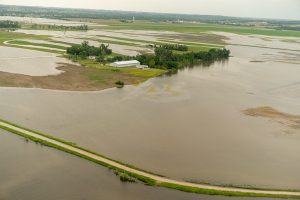Farmers’ bottom lines at risk as growing conditions change
This blog was originally posted on EDF’s Growing Returns.
Iowa currently finds itself in a “Goldilocks climate,” with just the right measure and timing of humidity, rainfall and heat that help make the state a national leader in corn and soybean production. However, new research shows that climate change threatens to upset this balance.
Small shifts in rainfall and temperature can have considerable impacts on crops and farmer livelihoods. To better understand how these shifts could impact farmers, Environmental Defense Fund partnered with K·Coe Isom, an agricultural accounting and business advisory firm, to produce an in-depth report that quantifies the potential localized economic impacts from these shifts that Iowa corn and soy farmers could face as soon as the next 10 to 20 years.

Millions of dollars at stake in Iowa alone
Researchers found that farmers could see statewide gross farm revenues reduced by as much as $4.9 billion over the course of a decade — a loss of 3.6% of Iowa farm revenue from sales of corn, silage and soy.
Because with climate change agricultural prices are likely to rise, relative to without climate change, the impact to gross farm revenues from yield impacts will be offset to some degree by higher prices. Additional research is needed to understand how much agricultural regions like Iowa stand to offset yield losses through climate change-induced price increases.
With this caveat on unknown price increases, nearly every county in Iowa could experience decreases in gross farm revenues with losses of more than $50 million in almost half of the state’s counties in that same timeframe, and losses of more than $100 million in some western counties that are projected to experience higher yield reductions than the rest of the state.
Reductions in revenue would likely imply reductions in capital investment and off-farm spending. As a result, Iowa’s annual economic output could be reduced by between $367 million and $733 million, causing a statewide loss of 1,270 to 2,530 jobs, and reduce annual state revenue collections by $4 million to $8.3 million.
“A less desirable choice for the next generation”
The analysis drills down further by modeling how these crop yield impacts might affect a real representative family corn and soybean operation in central Iowa. The researchers obtained financial data for the farm, including harvest, sales and capital expenditure data, and modeled the impact of projected yield reductions on farm revenue over a five-year period (2014-2019).
When the anticipated crop yield declines from climate change were retroactively applied to the past five years, researchers found that the family farm would have lost between $50,000 and $90,000 in revenue per year, equaling a total potential loss of $360,000 over the five-year period.
As the farm owner observed, this reduction in revenue would have also made “returning to the farm a less desirable choice for the next generation,” and would have been “especially hard on those families newest to farming.”
Near-term solutions to avert economic loss
Much can be done to address climate change and minimize the financial impacts on farmers, and this report identifies a few ways federal, state and local governments can help mitigate emissions and help farmers further adapt to climate change.
Public funding and private sector programs can incentivize management practices that limit greenhouse gas emissions, improve soil health and build resilience in agriculture. For example, the federal crop insurance program could incorporate incentives for farmers that adopt practices that reduce crop yield risk.
Additionally, public funding could support the development of climate-resilient seed varieties, improvements to nutrient management and other climate adaptation strategies. Investing additional funding in Iowa’s public university systems to assist with the creation of practical, publicly available research could also help farmers put these strategies into practice.
Iowa’s farmers have adapted to changing farming conditions in the past, but climate change poses a more significant shift that requires a proactive response. Policymakers can help ensure farmers have the resources they need to withstand the growing risks posed by climate change and to protect the livelihoods and revenues that make Iowa a global agricultural leader.
For more information, download the full report.











